Western Guilt and the Great Reset
Here’s the bottom line on the just-ended COP 26, the international climate change conference that’s been meeting for the last two weeks in Glasgow, Scotland.
The Biden administration, speaking for the United States, has committed itself to substantial cuts in carbon dioxide emissions in the coming decades; as President Biden himself said in Glasgow on November 1, the U.S. will commit to 50-52 percent reductions in CO2 from 2005 levels by the year 2030.
Biden further pledged a “net-zero emissions economy” by no later than 2050. These promises, Biden added, “will demonstrate to the world” that the U.S. is “not only back at the table” but will “hopefully lead by the power of our example.” And as we have already seen, the Biden administration is fully intent on “leading” by shutting down, as best it can, American carbon-energy supplies.
But here’s a question: Which countries will be led “by the power of our example” on downward CO2? The countries that emit the most CO2 and that are still planning to emit more? Or the countries that are already reducing their CO2?
As a matter of climate mathematics, it’s obvious that if the countries that emit the most continue to emit—and even grow to emit even more—then it doesn’t really matter what the reduction-minded countries do.
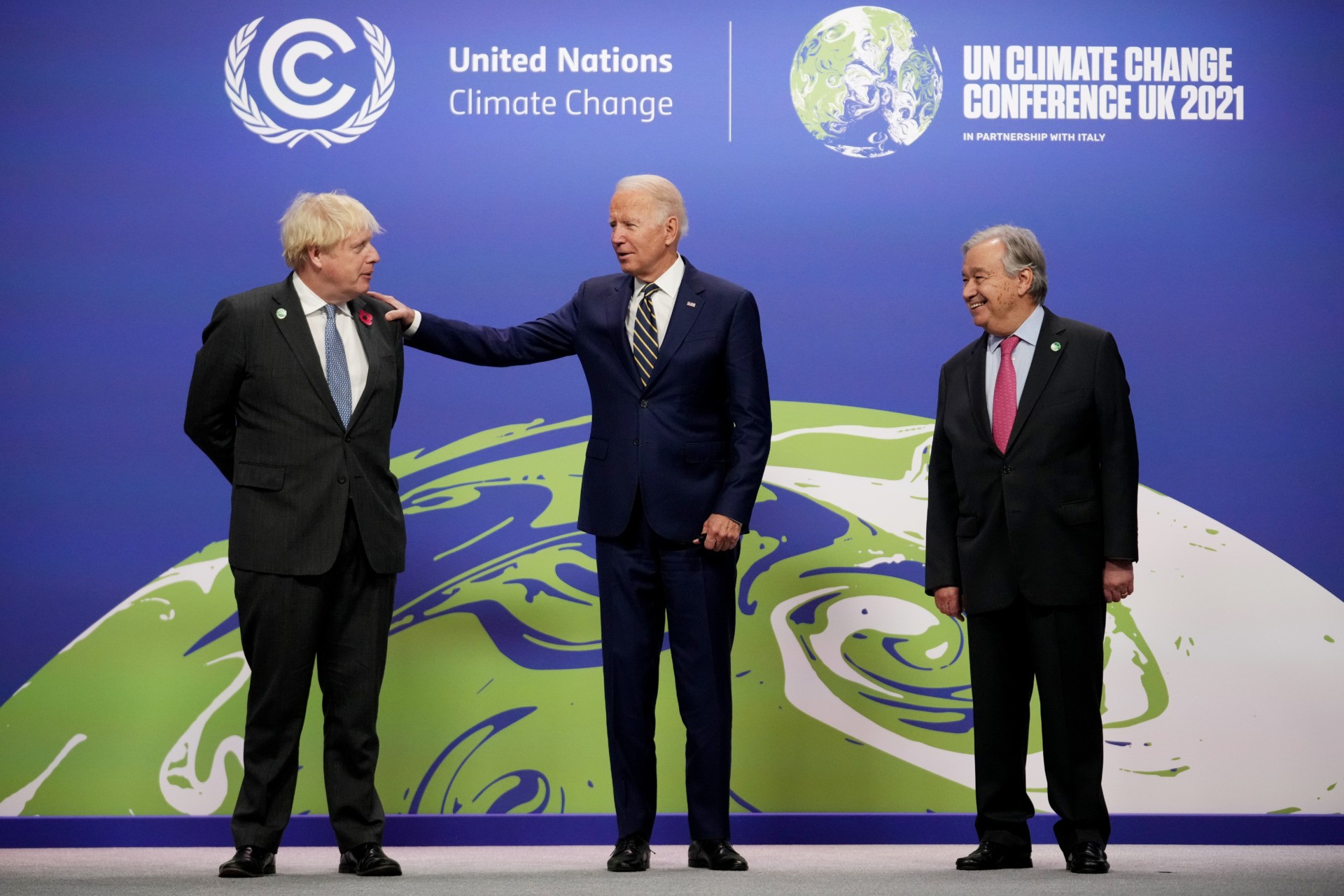
British Prime Minister Boris Johnson (L) and UN Secretary-General Antonio Guterres (R) greet U.S. President Joe Biden as they arrive for day two of COP26 at SECC on November 1, 2021 in Glasgow, Scotland. (Christopher Furlong/Getty Images)
If the real goal is to cut CO2, then it would be obvious that the big emitters—and even bigger future emitters—should be called out. Yet that didn’t happen, because that’s not how the COP process works.
You see, COP—the first Conference of the Parties was held in Berlin in 1995–is really about two things: first, the guilt feelings of Westerners; and second, the Great Reset. (Breitbart News has lovingly—okay, not so lovingly—chronicled this Great Reset, first conceived by the founder of the World Economic Forum, Klaus Schwab, the reigning King of Davos.)
These two thoughts—feeling guilty about the last three centuries of Western economic growth, and the desire to Reset the West along progressive lines—are combined in the person of John Kerry, the Biden administration’s climate envoy.
In fact, to say that Kerry is an envoy is to drastically understate his power.
Being a green billionaire himself (he married well), Kerry represents the interests of the entire green-billionaire donor class, which is the greatest single power in today’s Democratic Party. So if you ever wonder why Middle Class Joe let himself get talked into all this green stuff, it’s because, in many ways, Upper Class John outranks him. (We can save the fact that Kerry is a private-jet-flying, yacht-sailing, multiple-house owning, CO2-spewing hypocrite for another time.)
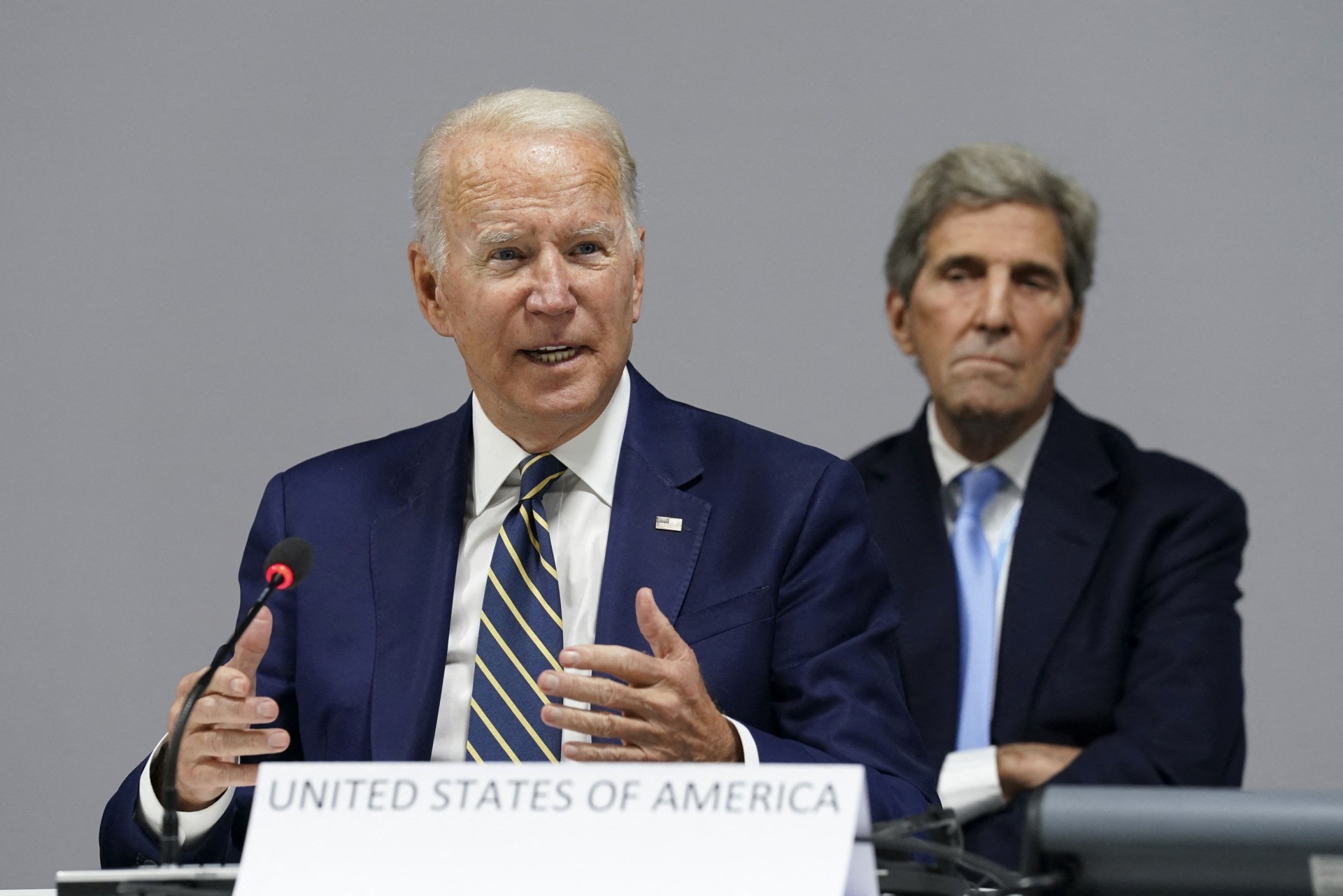
U.S. President Joe Biden, flanked by U.S. Climate Adviser John Kerry, delivers a speech at the UN Climate Change Conference (COP26) in Glasgow, on November 1, 2021. (KEVIN LAMARQUE/POOL/AFP via Getty Images)
Because COP is really a plaything for rich leftists—Al Gore was a driving force in its launch back when he was vice president, before he, too, became a green plutocrat—it checks all the boxes of Western progressivism. It focuses on the alleged sins of the West (defined as the U.S. the European Union, and a handful of other countries whose leaders think along the same liberal lines—at least for now) and ignores the violations of everyone else. As a result, COP is a hammer with which to clobber the real enemy: the American middle class, including, of course, all those Trumpy Deplorables.
So when the Biden administration dismisses concerns about inflation or shortages, please know that it’s really all part of a plan—a plan to get Americans used to having less. That’s the Great Reset as it applies to Main Street; John Kerry’s favorite summer haunt, Martha’s Vineyard is, of course, a different story.
In pursuit of this Resetting, the West will spend trillions to further reduce its already falling CO2 emissions, while the rest of the world will do little or nothing, except maybe collect still more trillions in special climate aid.
To illustrate, let’s take a closer look at the climate math.
The U.S. and the European Union account for about 32 percent of world CO2. If we add a few other “Western” countries, such as Canada and Japan, we get up to perhaps 40 percent of planetary emissions. Interestingly, for these countries, CO2 emissions are actually falling. The U.S., for example, emits less CO2 today than it did in 1985.
In other words, the countries that are ruled by leaders who are “into” COP 26, and the climate change issue overall, account for about two-fifths of world CO2 emissions.
Okay, so now to the other countries of the world, which account for three-fifths of world CO2 emissions. The biggest of these emitters, of course, is the People’s Republic of China, which by itself accounts for more than a quarter of planetary CO2—a full 29 percent.
For decades now, the Chinese have been building thousands of coal plants. In fact, Chinese coal plants built in 2020 alone will generate more than 41 megawatts of electricity. In addition, China has financed more than $127 billion in carbon-based energy projects around the world, including more than $50 billion in coal projects.
In the crisp words of the American economist and demographer Joel Kotkin, “In contrast to the elites in the West, China’s strategy is shaped by self-interest, not guilt.”
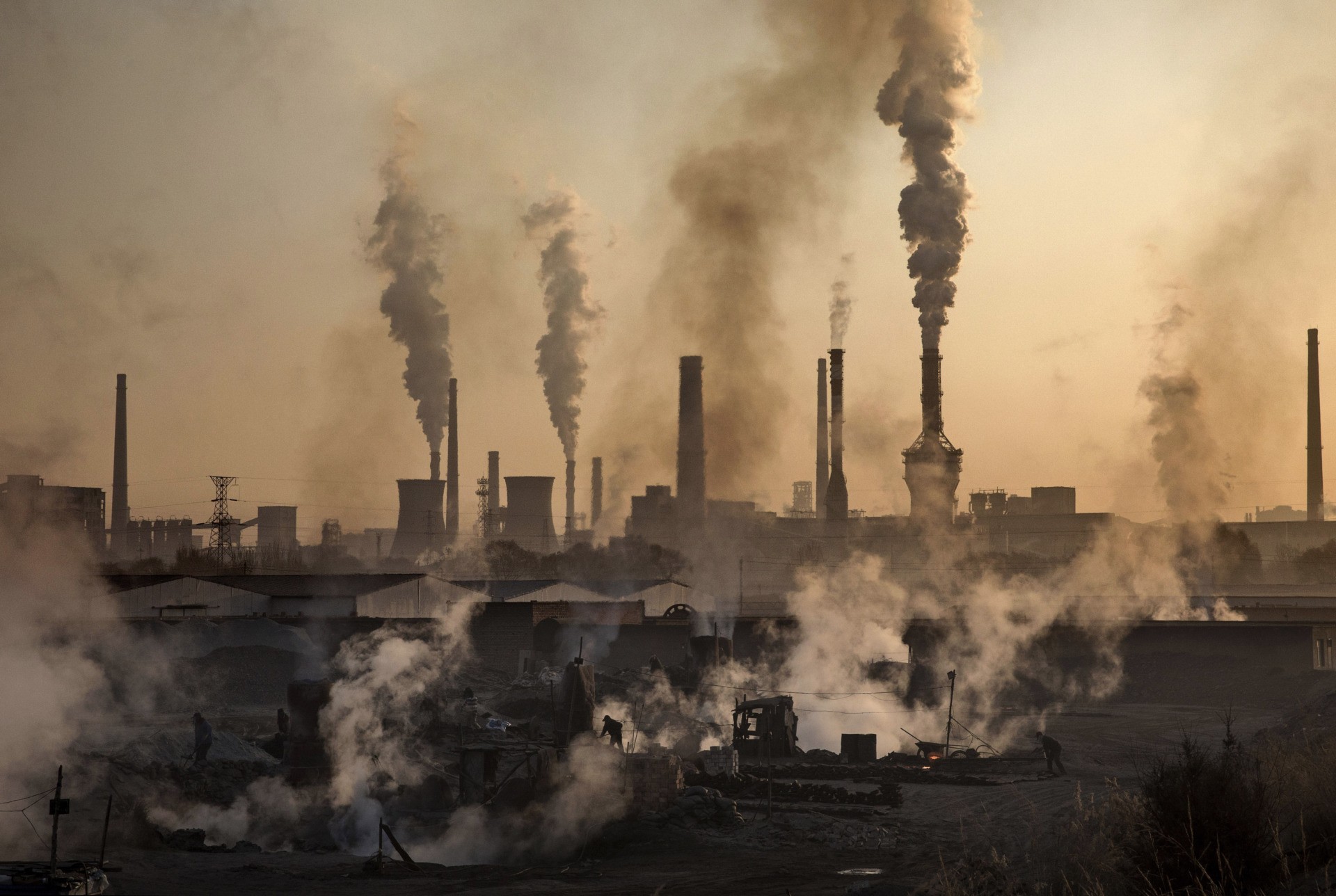
Smoke billows from a large steel plant on November 4, 2016, in Inner Mongolia, China. (Kevin Frayer/Getty Images)
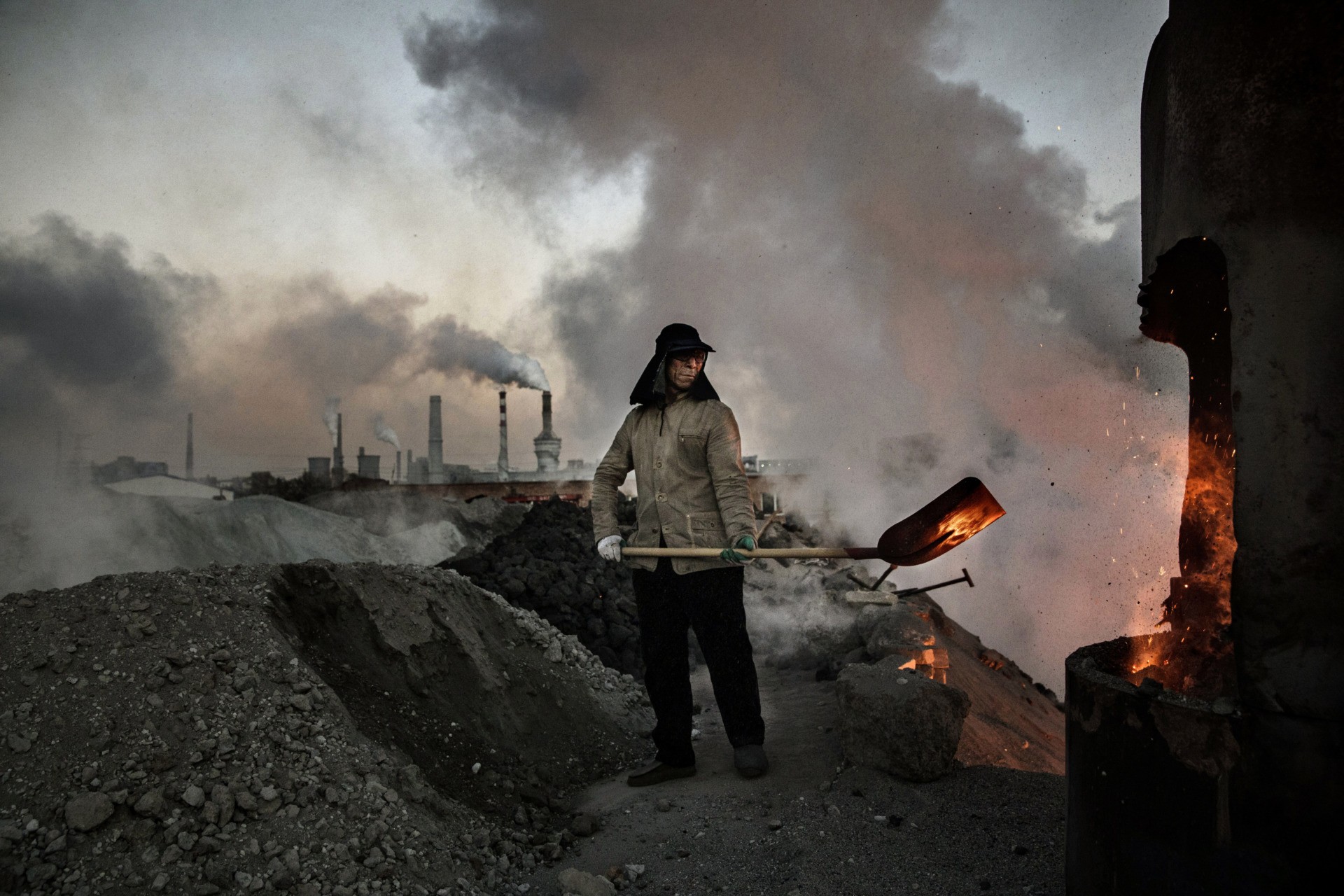
A Chinese worker loads coal into a furnace as smoke and steam rises from a steel factory on November 3, 2016, in Inner Mongolia, China. (Kevin Frayer/Getty Images)
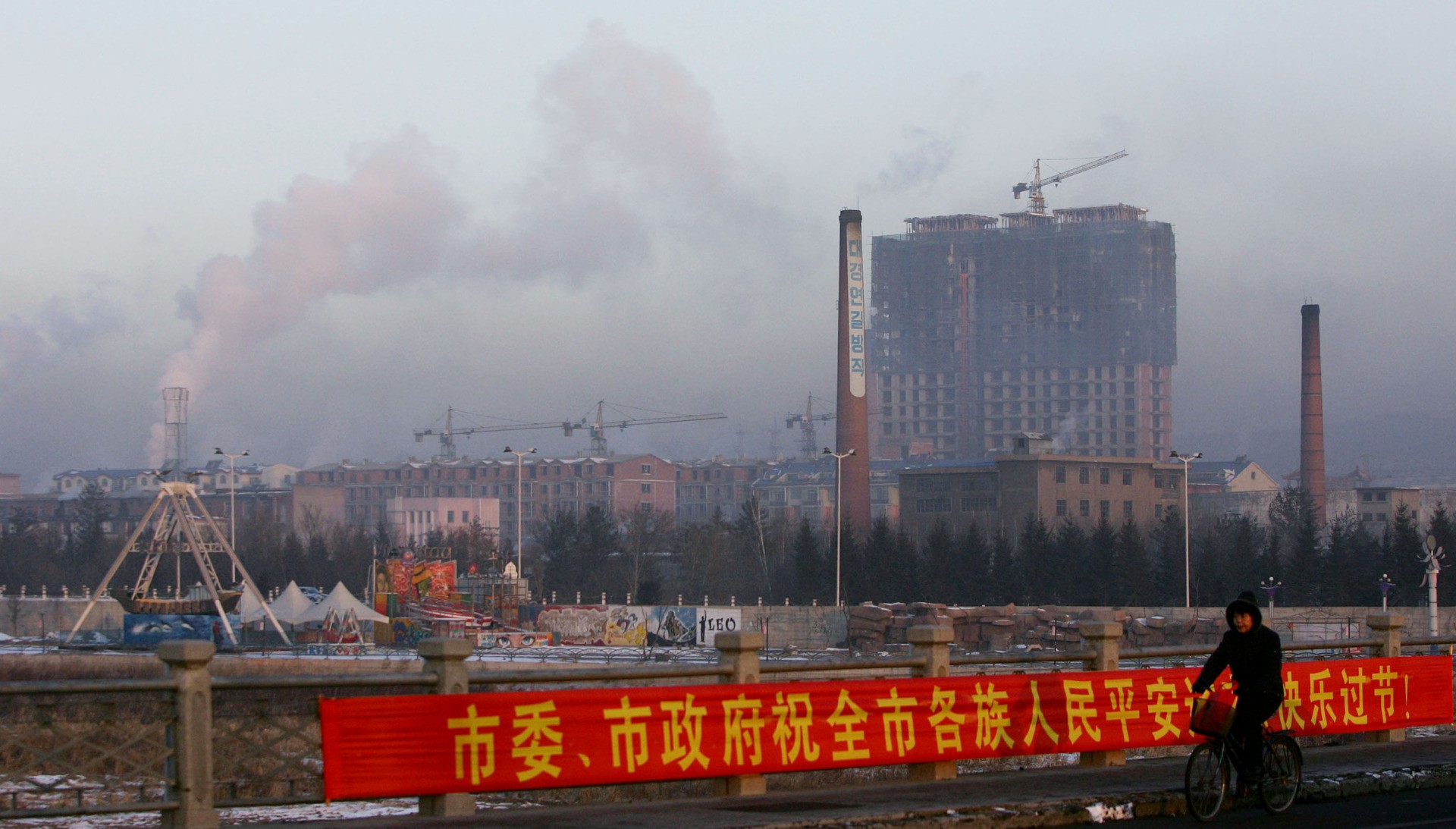
Smoke billows from a coal-fueled plant on February 16, 2007 in Yanji, China. (China Photos/Getty Images)
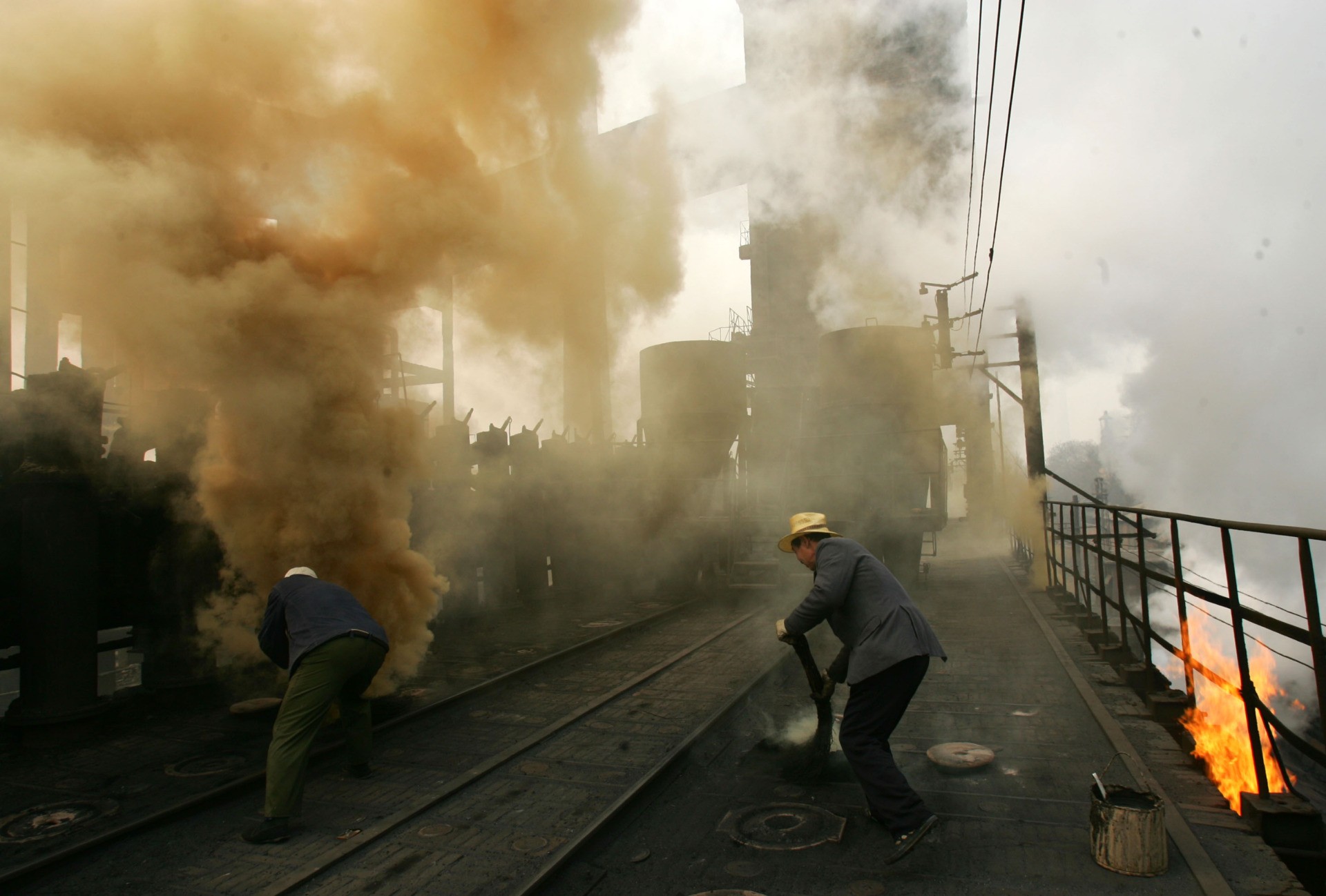
Workers focus on the coke furnace at the Xian Coking Factory on February 2, 2007, in Xian of Shaanxi Province, China. The factory emits about 300 million cubic meters of exhaust gas every year. (China Photos/Getty Images)
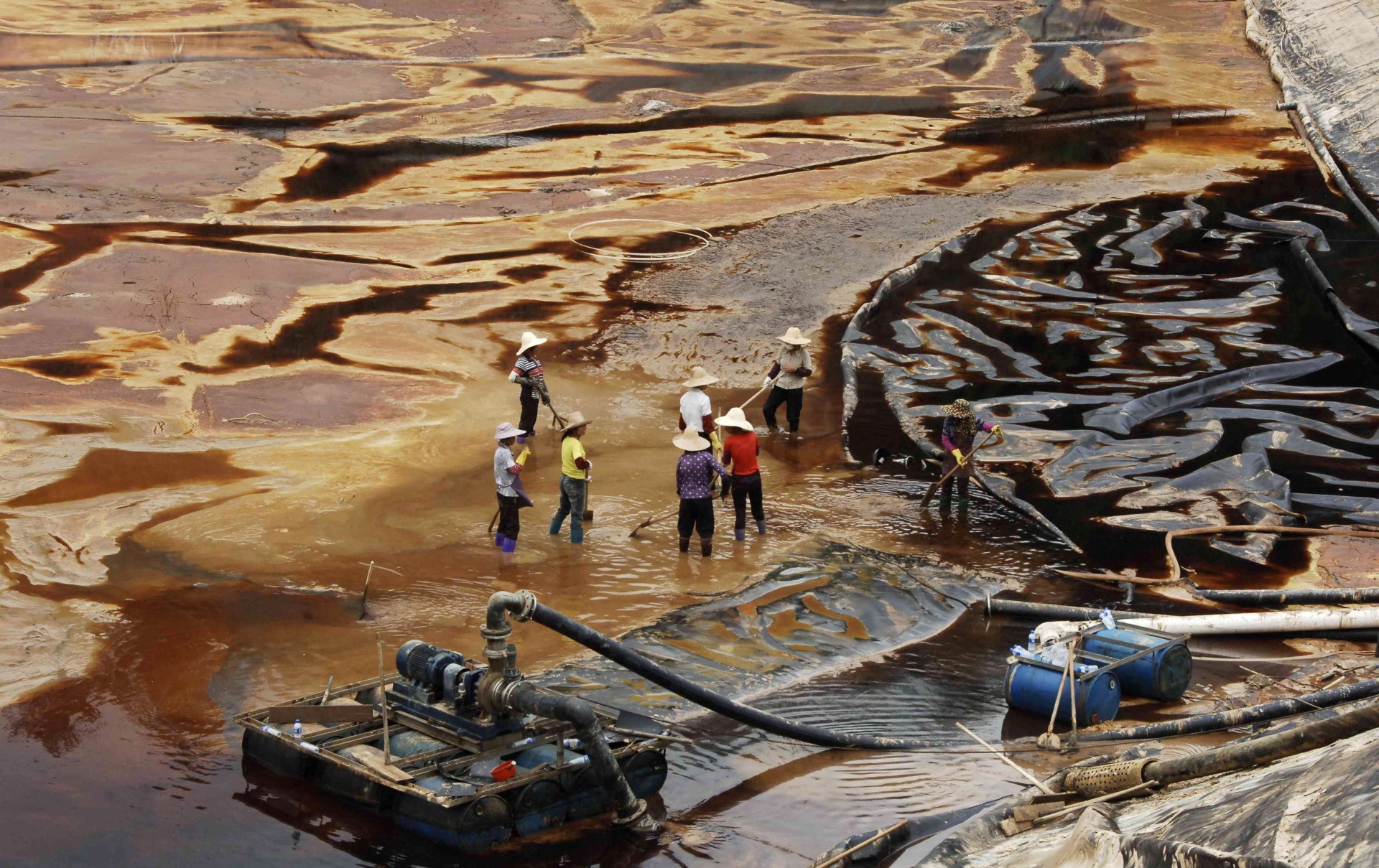
Workers drain away polluted water near the Zijin copper mine in Shanghang on July 13, 2010, after pollution from the mine contaminated the Ting river, a major waterway in southeast China’s Fujian province. (AFP via Getty Images)
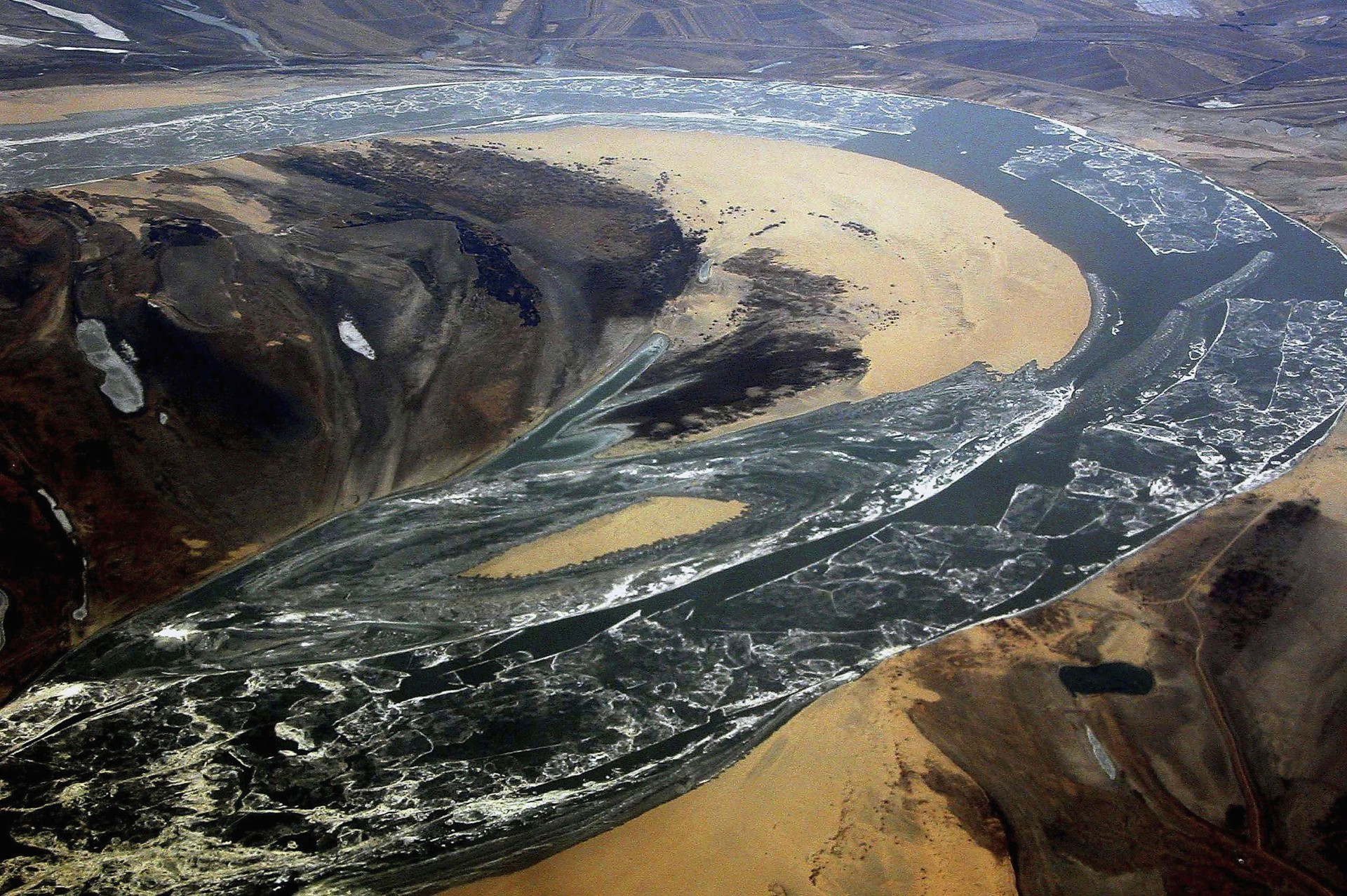
The polluted Songhua River is seen in an aerial shot on November 22, 2005, near to Harbin of Heilongjiang Province, northeast China. (China Photos/Getty Images)
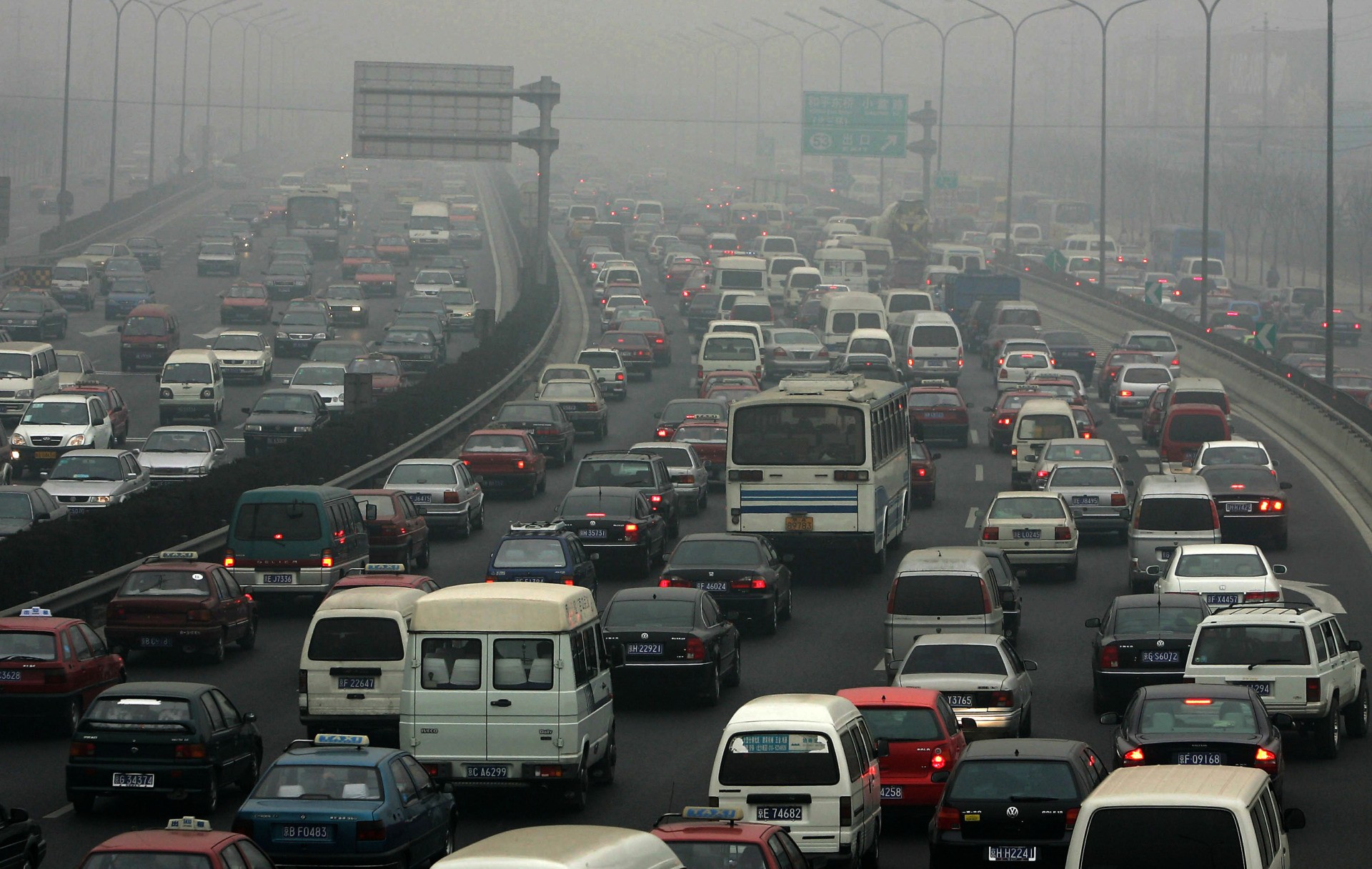
Cars sit in gridlock in heavy fog on December 14, 2004, in Beijing, China. (Guang Niu/Getty Images)
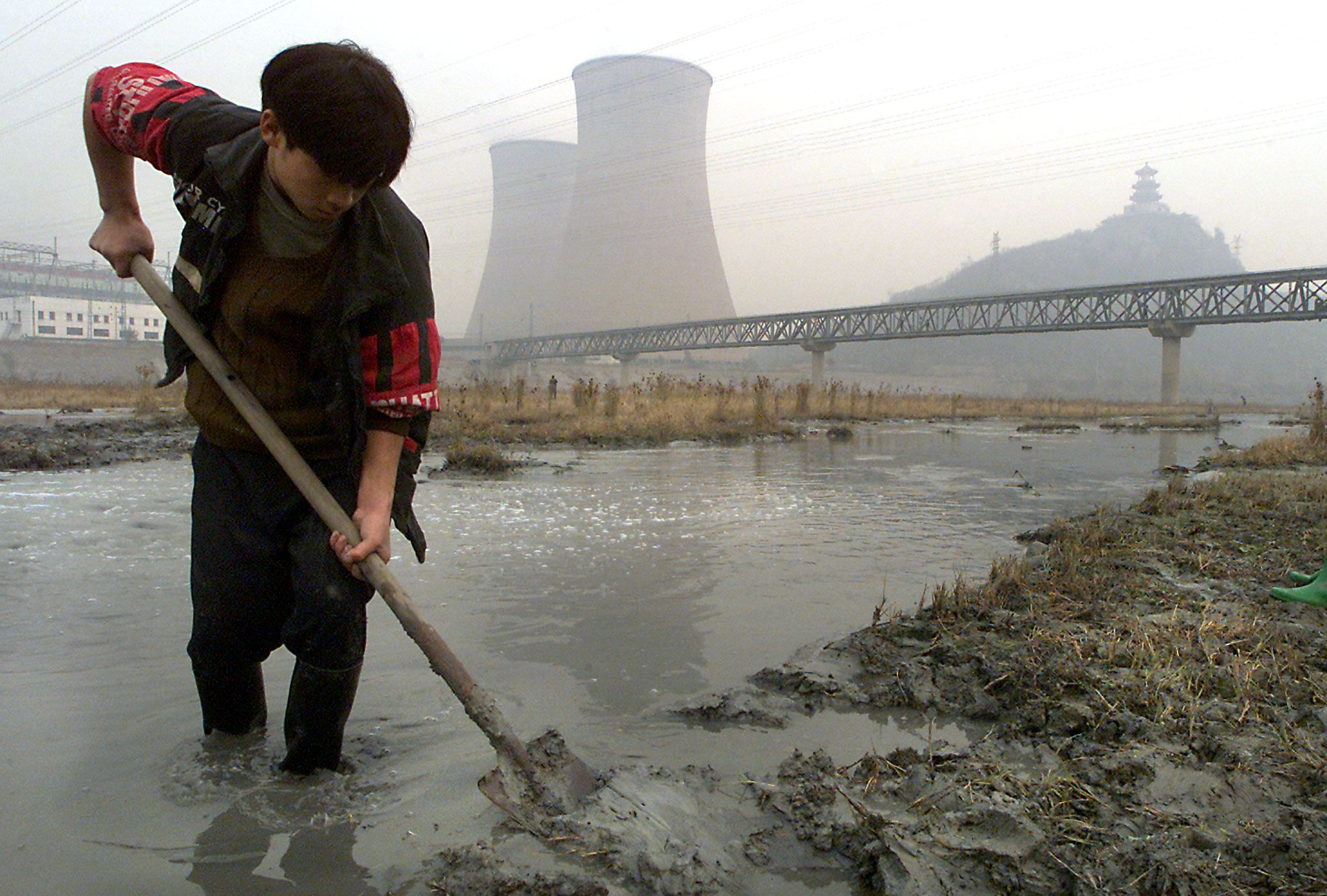
A worker shovels heavily polluted mud and water from an almost dried up river bed to form a small diversion in the stream next to a massive power plant in Beijing. (STEPHEN SHAVER/AFP via Getty Images)
And as for all the other countries of the world, they’re much more inclined to follow China’s model, burning carbon-based fuels. Why? Because that’s the way to grow, that’s why. Having seen greens in action in the West, shutting down factories and the like, other people around the world can hardly be expected to trust them greens with their livelihoods.
This is the basic asymmetry in the world: Liberal elites in Western countries feel guilty and want to Reset, while everyone else feels fine and wants to keep growing and emitting.
So will any of this change after COP 26? In a word, no.
Agreeing to Not Agree
It’s true that on November 10, the U.S. and China reached their own one-on-one agreement in Glasgow. Yet upon inspection—even by the admiring eyes of the Main Stream Media—it is revealed to be nothing more than a paper tiger.
To be sure, The New York Times did its best to gussy up the agreement (Kerry has always been a favorite of the Times, as he so perfectly epitomizes its snobby liberal values). Thus the Times headline trilled “China and the United States Agree to Work Together to Tackle Climate Change.” Okay, so that’s pretty good: Kerry’s comms team will be sure to include that header in their p.r. kit when they apply for their man’s Nobel Peace Prize.
Still, the Times is enough of a newspaper to notice when the actual news doesn’t fit the progressive dream-scheme. And so then came the sub-headline, which was a bit of a downer: “As nearly 200 nations struggle over global climate negotiations, the world’s two biggest polluters sign an agreement, but it was short on details.” We can pause over those last words, short on details. As we all know, if a deal is short on details, it’s not much of a deal.
For his part, Kerry was exultant, declaring grandly, “On climate, cooperation is the only way to get this job done.” Yet tellingly, the Chinese envoy, Xie Zhenhua, would only commit to “enhancing climate action.” Whatever that means.
To help things along perceptually, at least on the Western side, the Times article trotted some favored go-to experts, one of whom said cheerfully of the communique, “It means the intense level of U.S.-China dialogue on climate can now begin to translate into cooperation.”
Yet even the Times, which has been front-paging doom-pieces on climate change for more than three decades (back in 1988, it was called “global warming”), had to admit:
The joint agreement was short on specifics. It did not extract a new timetable from China under which the country would ratchet down emissions, nor did China set a ceiling for how high its carbon dioxide and other greenhouse gases would reach before they started to fall. China agreed to “phase down” coal, the dirtiest fossil fuel, starting in 2026, but did not specify by how much or over what period of time.
Other MSM outlets had the same reaction; that is, once you get past the platitudes, there’s not much there. Here’s Axios: “The agreement is long on ambition and short on specifics, with mentions of a working group and cooperation in areas like renewable energy and clean tech.” We can add that “working groups,” stretching out over the years, are good work for the permanent floating crap game of handsomely expense-accounted COP-ocrats.
The Washington Post’s foreign policy columnist Fareed Zakaria observed that the agreement was “a very small step.” He added, “It did not have the kinds of specific targets that marked the 2014 agreement negotiated by the Obama administration that preceded the Paris accords.” In other words, this latest “deal” is less of a deal than was reached seven years ago. So much for urgency!
So, to sum this up: In Glasgow, the People’s Republic of China committed to nothing.
Even on coal, China committed merely to “phase down” its coal, with no real timetable associated with that phase-down. In other words, for a good long time at least, the PRC will be powering its industry–including its breakneck nuclear weapons production–with the cheapest possible fuel, namely coal.
It’s the Chinese military threat that the U.S. should be worried about, and yet as Kerry has said, as far as the Biden administration is concerned, a “deal’ on climate change is more important than anything else.
Besides, in the meantime, Kerry and the COP-sters find themselves in other disputes, which will prove even more costly for . . . guess who.
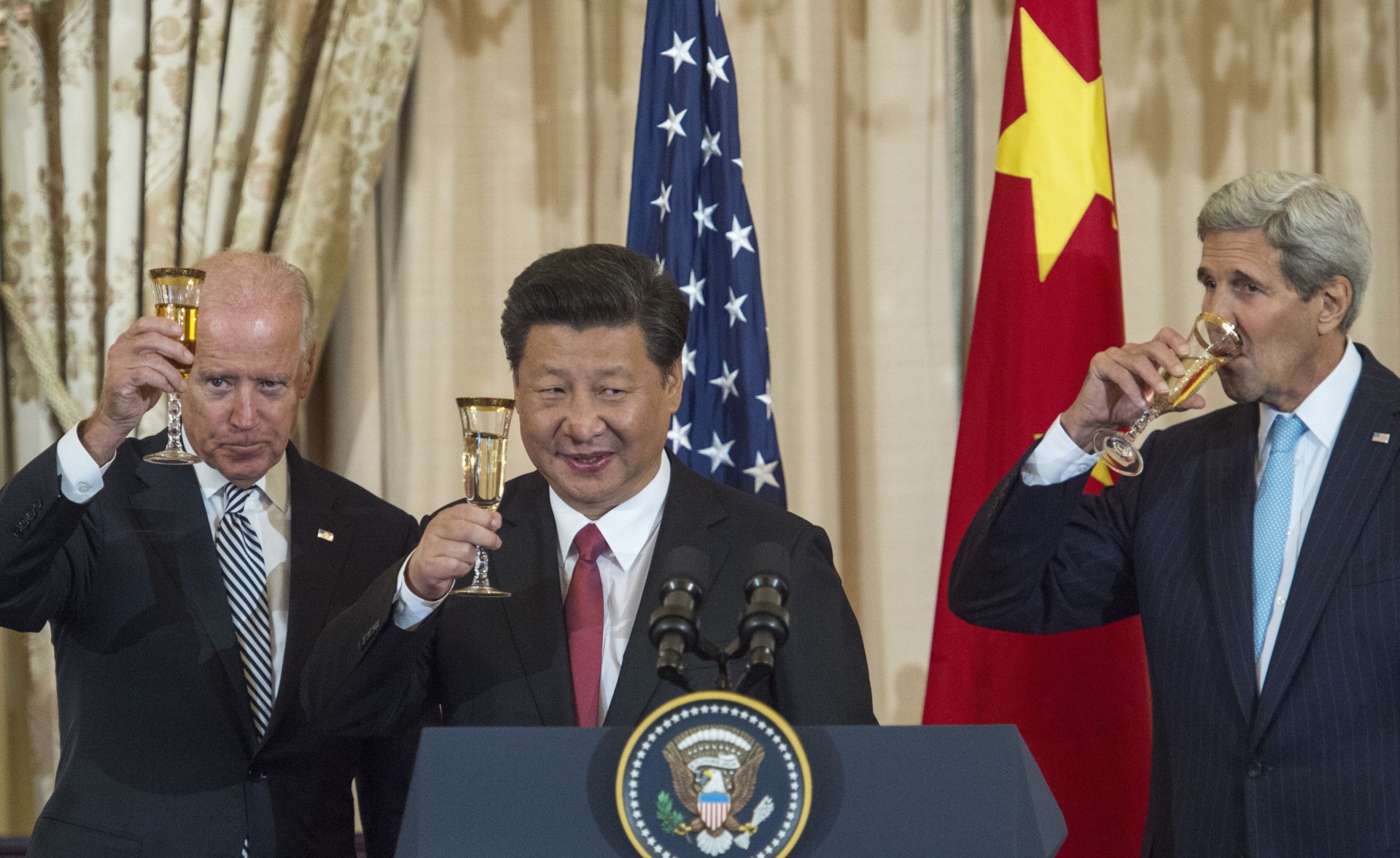
U.S. Vice President Joe Biden, Chinese Communist Party leader Xi Jinping, and U.S. Secretary of State John Kerry make a toast during a State Luncheon for China hosted by Kerry on September 25, 2015, in Washington, DC. (PAUL J. RICHARDS/AFP via Getty Images)
The Rumble with the Rest of the World
Beyond China, there’re all the other countries—the world’s total population is almost 7.8 billion. Not surprisingly, all those people have their own views, which don’t much align with those of Kerry and his fellow fatcat Resetters.
A Politico headline sets the stage: “Emerging economies spar with U.S. over ‘carbon colonialism.’”
It seems that a bloc of 24 counties—including China, India, and Saudi Arabia—are backlashing against “colonial” pressure from the West. These angry countries want $1.3 trillion a year. And by the way: Did you catch that China is on that list of countries demanding that annual $1.3 trillion? China is a rich country, and yet when the gravy is training, it pretends to be an “emerging” country. It’s easy to see a scenario where the coal-burning Chinese are rewarded by the West for saying that they’ll lay off the coal someday. And did we mention that there are 197 countries at COP?
So, if the outstretched palms of the first 24 countries get greased, it’s a cinch there will be a lot more hands out.
The Kerry Theory
The Kerry-Biden administration is operating on the theory that it knows what’s best: the Great Reset. And the Kerryites further know that the U.S. is full of Deplorables, who deserve some punishing Resetting.
That’s what COP 26 is all about.
Indeed, we can already see the Reset in action, starting with higher gas prices. Yes, higher costs at the pump are a pain for ordinary Americans, but ask yourself: When’s the last time that Kerry filled up his own tank?
Following the Kerry Theory, White House press secretary Jen Psaki has taken to highlighting the upside of high gas prices—namely, pushing along the Great Reset. On October 7, she said, “Certainly, we all want to keep gasoline prices low, but the threat of the crisis—the climate crisis—certainly can’t wait any longer.”
And here’s Rep. Pramila Jayapal, speaking for hard greens in her hometown of Seattle and everywhere else, telling Americans to hush up about high gas prices because they are needed as part of the “transition” to green energy. Besides, Jayapal promised, the multi-trillion-dollar Build Back Better plan will reduce other prices. You believe that don’t you? Don’t you?
All this spinning aside, the Great Reset is clearly not good politics. As the recent election results show, most Americans would like to be just left alone, not hectored by the greens’ woke allies, and Middle Americans certainly don’t want to see a decline in their living standard. And so the idea that green billionaires such as Kerry—and mere millionaires, such as Biden—would seek to tell them what to do all for the sake of some avant-garde theory is, well, infuriating to ordinary folks who vote.
So why are Kerry & Co. so adamant about the Great Reset? Because they believe in it. To them, it’s the right thing to do–why, some say it’s even a religion. For true believers, deep faith is a lot more important to than winning elections.
To be sure, such an aloof attitude doesn’t do Joe Biden any good, as he faces an election in less than three years. But when was the last time anyone thought that the president really runs this administration?
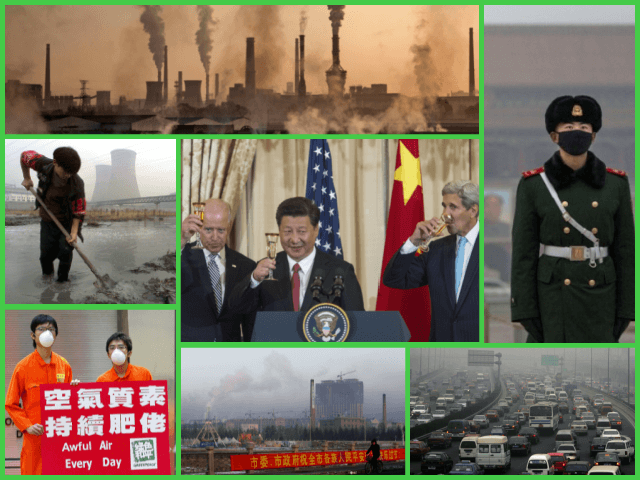
COMMENTS
Please let us know if you're having issues with commenting.